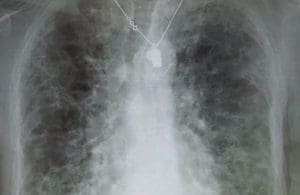
IPF image from Wikipedia
The drug development landscape in idiopathic pulmonary fibrosis is changing rapidly. “There are probably 30 or 40 different compounds in development,” said Dr. Toby Maher, a presenter at the Pulmonary Fibrosis Foundation (PFF) Summit held last month. Of those, a handful have reached Phase 2 and Phase 3 clinical trials. Here, we highlight a handful of pulmonary fibrosis therapy candidates.
1. Pamrevlumab
One of the pathways drug developers have explored to treat IPF involves connective tissue growth factor (CTGF). The protein signals to cells to stimulate the development of fibrotic tissue In IPF. “We know that there’s an excess of CTGF,” Maher said. “And we know that that can be blocked using antibodies.”
This observation led to the development of a monoclonal antibody first called FG3019 and later rechristened as pamrevlumab.
Developed by FibroGen (NSDQ:FGEN), Pamrevlumab is now the subject of two Phase 3 studies. One of those requires that participants not receive background treatment with the existing antifibrotic therapies, nintedanib or pirfenidone. In the second study, patients can receive background treatment with existing antifibrotic therapies.
2. Recombinant human pentraxin-2
Pentraxin is a protein in the blood with anti-inflammatory and antifibrotic properties. Individuals with pulmonary fibrosis may have a deficiency of pentraxin, which stirred interest in offering intravenous replacement pentraxin as a potential IPF treatment.
A Phase 3 trial followed a 2b open-label study that followed patients for 28 weeks. The Phase 2b trial tested the intravenous administration of the drug, which appeared to show a benefit in terms of forced vital capacity (FVC), which refers to the amount of exhaled air in the forced expiratory volume (FEV) test. “Importantly, the drug also appeared to have a beneficial effect on six-minute walk,” Maher said. “That’s a test where patients will walk up and down the corridor for six minutes, and we measure the distance they can walk in that time.” Participants taking pentraxin had stable six-minute walk distances, whereas those who received a placebo saw a reduction in walk distance over the same time.
The drug has since moved on to a Phase 3 study, which is now actively recruiting.
3. GB0139
Known initially as TD139, GB0139 inhibits galectin-3, a molecule found on the surface of inflammatory cells, including macrophages, which are inflammatory cells in the lung. “We know that these cells that express galectin-3 play a role in the development of fibrosis,” Maher said.
Having observed from preclinical models and animal studies that blocking galectin-3 has antifibrotic effects, Galecto (NSDQ:GLTO) is testing the potential of GB0139 as a potential treatment for idiopathic pulmonary fibrosis. “What’s particularly interesting about this drug is that it’s been developed in an inhaled form,” Maher said.
The drug has been studied in a small Phase 2a study. When delivered with an inhaler, the drug reached fibrotic regions of the lung and reduced local galectin-3 levels. The drug also appeared to lessen a biomarker known as platelet-derived growth factor.
A Phase 2b study focused on GB0139 is currently recruiting.
4. Treprostinil
Initially developed for the treatment of pulmonary hypertension, Treprostinil from United Therapeutics (NSDQ:UTHR) could also offer the potential to some patients with pulmonary fibrosis. Referring to high blood pressure in the blood vessels flowing through the lungs, pulmonary hypertension can occur alone and in individuals with chronic lung diseases such as pulmonary fibrosis.
Drug companies have tested a number of drugs in patients with pulmonary hypertension related to pulmonary fibrosis. “And unfortunately, almost all of those trials have been negative,” Maher said.
Treprostinil may potentially offer more promise for IPF patients with pulmonary hypertension.
The drug, which is a prostacyclin analog, dilates blood vessels in the lung. A trial of treprostinil involving patients with fibrotic interstitial lung disease found that treprostinil recipients had a noticeable improvement in their walk distance over the 16 weeks of the study. Conversely, placebo recipients had a slight deterioration in walk distance. The drug also appeared to have stabilized patients’ lung function over the trial. “This was a slightly unexpected apparent benefit of the drug,” Maher said.
Discontinued: Ziritixistat
Ziritixistat from Galapagos NV (NSDQ:GLPG) and Gilead Sciences (NSDQ:GILD) unfortunately won’t be a pulmonary fibrosis treatment — at least not for the foreseeable future. In February, the companies announced their decision to stop the ISABELA Phase 3 clinical trials exploring the autotaxin inhibitor ziritaxestat in patients with idiopathic pulmonary fibrosis. Galapagos also announced the discontinuation of the broader ziritaxestat research program in February 2021.
Even though the ISABELA studies were halted early, researchers are still interested in blocking autotaxin as a potential idiopathic pulmonary fibrosis treatment.
“There’s a lot of good data from basic science and cellular models to show that autotaxin plays a key role in the development and evolution of fibrosis,” Maher said. “And if we look in animal models, blocking autotaxin can help prevent fibrosis.”
One complication for the ISABELA trial was the difficulty in gauging the impact of the COVID-19 pandemic in the studies.
Filed Under: clinical trials, Drug Discovery, Pulmonology





Tell Us What You Think!
You must be logged in to post a comment.